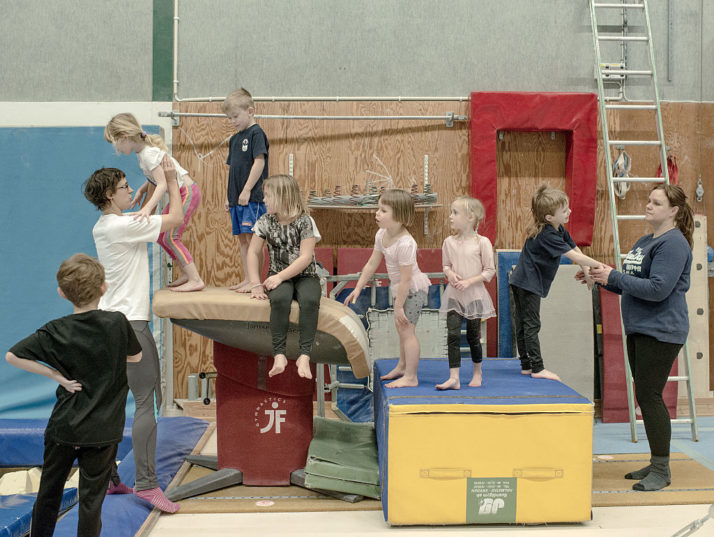STOCKHOLM — A proposed overhaul of the Swedish preschool curriculum to promote gender equality — dismissed by the opposition as “gender mumbo jumbo” — has become an unexpected hot-button issue ahead of the country’s general election on Sunday.
In a tight race marked by the rise of the far-right Sweden Democrats, the fate of the country’s largest political groups — the center-left bloc that includes the ruling Social Democrats and Greens; and the four-party center-right opposition known as the Alliance — could be determined by the performance of its smallest parties.
And for two key parties — the Greens and the right-wing Christian Democrats — the government’s preschool reform proposal has become an unexpected political battleground, as they try to boost support ahead of the vote.
The proposal — finalized just two weeks ahead of the election — would task preschools with ensuring “gender equality” between children aged 1 and 5, to “inspire and challenge them to widen their abilities and interests without being limited by gender stereotypes.”
The new curriculum would replace a system that has been in place for 20 years.
The Christian Democrats have staked out their ground as the plan’s main critics, launching a series of attacks on the government’s proposals and deriding the plan as based on “pseudo-scientific” gender theory in a number of high-profile speeches and media appearances.
The party’s attacks prompted Education Minister and Green party co-leader Gustav Fridolin to accuse the party on primetime TV of stirring up controversy to score political points.
The strategy appears to be paying off, with surveys showing both parties polling above the 4 percent parliamentary threshold at the height of the debate in August.
Start them young
The issue was bound to be controversial.
Swedish voters rank schools and education as the third most important topic in the upcoming election, behind health care and immigration, according to a survey by Swedish pollster Novus.

Children practise gymnastics in Halmstad, Sweden | David Ramos/Getty Images
Gender pedagogy has stirred up intense debates in the past, not least in 2012 when Swedish and international media reported on the emergence of preschools with “gender-neutral” profiles where children and staff were banned from using terms like “he” or “she” (han and hon, in Swedish), instead opting for the then new, gender-neutral pronoun hen.
The new curriculum would replace a system that has been in place for 20 years, and states, for example, that preschools “have a responsibility to counteract gender patterns that limit children’s development, choices and learning.”
The goal is “to provide children with alternatives,” according to Fridolin, the education minister. “Your options shouldn’t be restricted by the fact that you happen to be a boy or girl.”
Fridolin has suggested preschool teachers should supervise play in order to encourage children to avoid “reinforcing gender stereotypes,” and step in if boys take up too much space or chase after girls, or if boys and girls do not mix spontaneously.
The proposals have prompted the Christian Democrats to accuse the government of trying to infuse Swedish preschools with “radical feminism.”
Swedish preschools don’t need “politically correct do-gooders,” said Christian Democrats’ leader Ebba Busch Thor. “If a girl wants to play with dolls, is that so bad? Is that something preschools should spend time counteracting?”
For the Christian Democrats, giving young kids this kind of “freedom” amounts to “experimenting with children.”
This week, a Swedish tabloid, citing insider sources, revealed that Busch Thor plans to claim the post as equality minister if the Alliance were to form a government after the election, a demand that has apparently stirred in-fighting in the center-right bloc.
Fridolin has maintained that preschools should be paying attention to how children interact with one another, arguing that the #Metoo movement — prompted by sexual allegations against Hollywood producer Harvey Weinstein, and which has since brought down powerful men in dozens of industries on both sides of the Atlantic — shows that there is a direct connection between boys’ behavior in preschool and men’s behavior at their work places.
“If you accept that little boys don’t treat girls with respect, then they will likely continue to treat women disrespectfully as grown men,” he said.
‘A distrust of boys’
Sweden has dabbled in a number of different approaches to gender pedagogy, according to Mats Olsson, a lecturer at Malmö University who worked in preschools for 25 years.
For a while, the accepted method was the “compensatory approach,” which encourages boys to try their hands at games that are typically favored by girls, and vice versa.
The “minimalist” theory, which was popular later, held that children should be allowed to experiment with different toys or colors but gradually be steered toward less stereotypical behavior.
The current “norm-critical” approach — which suggests that children should be encouraged to realize they have the freedom to challenge societal norms — is less manipulative but also runs the risk of instituting new norms and ideals, of “soft boys and tough girls,” according to Olsson.

Children play on the “Puckelboll” pitch in Skaerholmen, southwest of Stockholm | Jonathan Nackstrand/AFP via Getty Images
Boys are most likely to be negatively affected, he added, because typical boys’ behavior is seen as disruptive and anti-social.
“If a 3-year-old boy refuses to sit still or be quiet, well I suppose one could see him as a representative of a patriarchal power structure. Or one could simply see his behavior as a protest or reaction against a form of activity that doesn’t suit him,” Olsson said.
The approach “fuels a kind of distrust of boys,” he added. “Their interests do not have much status.”
Others maintain there is no basis for the assertion that boys and girls are inherently attracted to different forms of play.
“The meta analysis of research into gender shows that there is greater variation within the genders than between them,” said Anne Rymoen, director of the Rainbow Workshop, a Stockholm preschool.
“It is the denial of biology that leads to these kinds of confused proposals” — Sara Skyttedal, former head of the Young Christian Democrats
More research is conducted into gender differences than similarities, she added, because it is funded by interest groups that want to “produce and sell different products for different genders, like separate razors for women and men.”
The Rainbow Workshop doesn’t ban or remove anything from the classroom, letting kids play with a range of toys. The emphasis is on “having an active dialogue with the children” and giving them a chance to “uncover stereotypes.”
Staff allow the children to use both gender-neutral and gendered terms, but avoid addressing them as “boys” and “girls,” calling them “friends” instead.
“There is no need to gender them,” Rymoen said. “It would be unfair, for instance, for adults to presume the gender of a 1-year-old because we can’t know what gender that child self-identifies as. Our starting point is to let children decide for themselves.”
The right-left divide
For the Christian Democrats, giving young kids this kind of “freedom” amounts to “experimenting with children.”
The government has refused to acknowledge that “beyond societal influence, there are biological factors that form the basis of who we are as human beings,” according to Sara Skyttedal, the former head of the Young Christian Democrats who is now running for parliament.
“It is the denial of biology that leads to these kinds of confused proposals,” she said, referring to the new preschool curriculum.
The issue is not inherently a fight between the right and left, Skyttedal insisted, but “many left-leaning liberals have bought into gender theory.”
Still, the debate over gender pedagogy has become inextricably linked with a power struggle between the right and the left, said Olsson of Malmö University.

Moderate Party leader Ulf Kristersson, Green Party spokesperson Gustav Fridolin, Christian Democrats leader Ebba Busch Thor and Sweden’s Prime Minister and Social Democrat party leader Stefan Lofven | Soren Andersson/AFP via Getty Images
“There is a general perception that criticizing gender theory is a right-wing position and that leads to suspicion toward those of us who take issue with the way the state wants to introduce gender pedagogy,” he said.
That perception stands in the way of more constructive education reform, he added.
“I think most parents don’t spend a lot of time thinking about how children are gendered but they do find it worrying that such a high proportion of boys finish nine years of compulsory education without achieving the grades necessary to get into high school.”
Instead of addressing discrepancies between girls and boys’ academic performances, “we get caught up in discussing things like gender-neutral pronouns,” according to Olsson. “I guess it’s easier to get worked up about that.”
